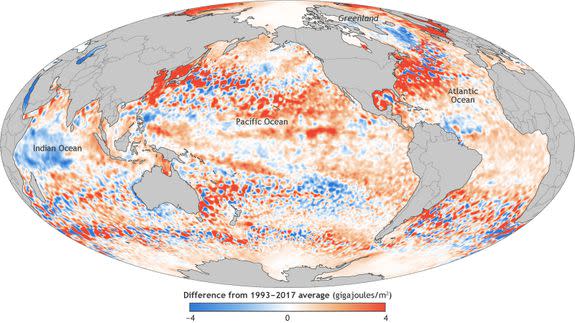Why sea creatures are fleeing their homes

There are 3,800 big thermometers floating in the ocean, and the readings don't lie: Over 90 percent of the warming created by humans is soaked up by the seas. Unsurprisingly, many creatures are feeling the heat.
In new research published Wednesday in the journal Nature, scientists found that global warming has forced twice as many marine species than land species to vanish from their hotter habitats —particularly near the already balmy equator. All the species examined were cold-blooded, or ectotherms.
"What we found so surprising is that global warming hits sea creatures the hardest," said Malin Pinsky, an evolutionary ecologist at Rutgers University and lead author of the research.
From one perspective, it's surprising because it gets so much hotter on land. "The ocean never gets that hot," noted Pinksy. Sea critters, then, aren't adapted to deal with such significant temperature increases. And that's the problem.
"That's their Achilles heel," said Pinsky.
As temperatures warm, especially in the already hot tropics, creatures can't tolerate the heat, and leave. What Pinksy and his team found were local extinctions, meaning over half of the 108 sea creatures they studied left their native homes and moved to cooler waters. Meanwhile about a quarter of land species — like species of lizards and geckos — left their homes as things heated up.

Image: NOAA
Many of these marine species, forced to flee from warming waters, are not just well-known, they're often food for humans, like halibut and winter founder. "This affects our dinner plates in many cases," said Pinksy.
After pouring through mounds of research on the known temperature limits of marine and animal species, Pinsky and his team also found that sea creatures are more likely to live on the edge of "dangerously high temperatures." In many cases, they don't have a choice.
"You don't have anywhere to go," said Natalya Gallo, a marine ecologist at the Scripps Institution of Oceanography who had no role in the study. "Maybe you can hide under a kelp leaf, but the entire water around you has warmed."
SEE ALSO: We're probably not going to hit the world's most important climate goal
On land, at least some animals have other options, especially during record-breaking heat waves. "They go into shade or a burrow," noted Pinksy.
It's about time that marine critters — of which fish provide the main source of animal protein for some 1 billion humans — receive more attention as the seas soak up Earth's accumulating heat. It's easier to pay attention to the plight of land animals, which certainly need conservation attention, too.
"We tend to focus on things in our immediate environment," said Kristine Stump, a tropical marine biologist who also had no role in the research. "We don't spend as much time under the water, and we may not be realizing what's happening [there]."
That makes it challenging to know when species who have been forced to relocate are facing threats to their population. Stump is reminded of the quote by earth scientist John Shepherd: "Counting fish is just like counting trees — except that they are invisible and keep moving."

Image: noaa
But as the planet's warming becomes more apparent (18 of the last 19 years have been the warmest on record), perhaps the conditions of sea creatures will receive more attention. "Ten years ago there was almost no discussion of the [climate] impacts on marine animals," said Pinksy. "Now we're finding they're the most sensitive."
How sensitive? The spawning migrations of the endangered Nassau grouper, for example, are tightly linked to the water's temperature, said Stump. And when many sharks choose to hunt or rest is strongly temperature-based, she added. In the ocean, where creatures can't escape to a shaded, cooler cave, their migrations, movements, metabolism, and meals are tied to temperature.
Sea creatures can't simply swim to deeper, colder climes. Deep-sea critters have spent millions of years — some during the time of dinosaurs — adapting to the deep, dark, isolated ocean. Fish near the surface can't just go down and expect to make a living, especially in the food and energy-starved depths. "Animals have special niches in the ocean," explained Gallo. "You move deeper, there's going to be less food available."
Scientists have only scratched the surface of how the baking seas will hit the swimming life therein. For instance, Gallo pointed out that this study, while detailed, could only look at how warming oceans affected these creatures as adults. Warming waters might very well impact young, vulnerable critters in their early stages of life — before they even emerge from eggs.
The warming is inescapable. It's no wonder some creatures are fleeing.
"Marine animals are not getting a reprieve from the heat," said Gallo. "You're just stuck in a warm pool."
WATCH: Ever wonder how the universe might end?


